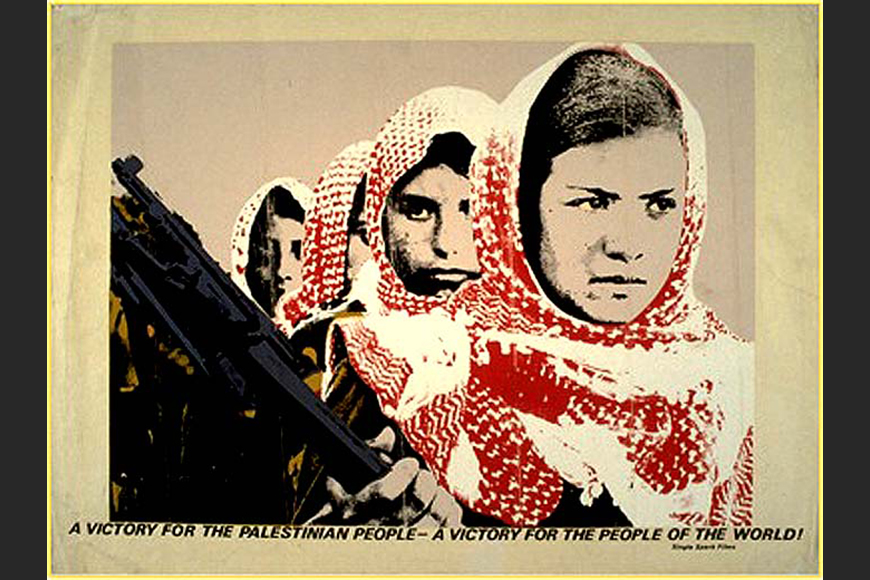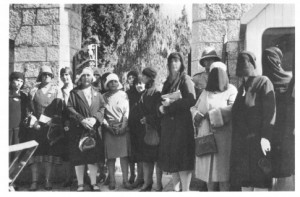When Palestinian women take up arms
By Khaled Diab
The shock elicited by Palestinian women taking up arms is due to local sexism and orientalist stereotyping, not historical or social reality.

Source: www.palestineposterproject.org
Friday 18 December 2015
Random stabbing attacks against Israeli soldiers and civilians have become a defining feature of the current wave of violence and protests in Jerusalem and the West Bank. The overwhelming majority of these attacks were carried out by young people aged under 25.
One aspect which has triggered a great deal of confusion and shock – both among Palestinians and abroad – is that a high number of attacks were perpetrated by young women. A fifth of attackers or alleged attackers were women, according to one estimate.
But is this surprise justified?
In my view, the incredulity these attacks have evoked is due to the intersection between sexism and orientalism. It is remarkable just how much the stereotypes of the Arab and Muslim women entertained by the local patriarchy and orientalists overlap. For both, the Arab woman is passive, weak and submissive, but the reality is very different.

Although it tends not to stick enough in the collective memory, Palestinian women have been involved in their national struggle since its very inception. An old black-and-white photo from the 1920s featuring Palestinian women protesting outside the British high commissioner's office in Jerusalem illustrates this reality eloquently.
Even though the involvement of Palestinian women has largely been in the peaceful aspects of the struggle, their participation in armed resistance and other forms of political violence – including terrorism – goes back decades, from the hijackings of the 1960s and 1970s to the suicide bombers of the second Intifada.
For example, Dalal Mughrabi, who trained as a nurse, went from saving lives to taking them. At the tender age of 19, she led a “fedayeen” operation from Lebanon into Israel, leaving a devastating trail of 38 dead Israeli civilians, including 13 children.
That an “angel of mercy” can turn into an “angel of death” is shocking to the sensibilities of many. But that is only the case if you subscribe to the prevalent gender myths that women are somehow gentler and more peaceable than men because of their central biological role in creating life.
However, the reality is that vengeance, anger and violence are human traits that affect men and women alike. The fact that women commit fewer acts of violence is not, in my opinion, due to their intrinsic nature, or that men are overrun with testosterone, but because of the greater social constraints placed on women, especially in traditional societies.
Equally unconvincingly, some women believe that their gender can make them more radical than men. “Women give life […] When they are involved, they are more faithful to the revolution because they defend the lives of their children too,” said Leila Khaled, the first woman ever to hijack an aircraft, who has become the icon of Palestinian armed resistance, even though she has claimed publicly that she never intended to harm, nor ever did in reality, any passengers.
Whatever role gender does or does not play in the commitment of Palestinians to their cause, the conflict is usually gender-neutral and does not distinguish between men and women.
“Living under occupation has direct impacts on the ability of people to live ‘normal' lives,” explains Nadia Dabbaghh, a child and adolescent psychologist who has researched the psychological effects of the conflict on youth. “This can lead to a sense of frustration in both men and women.”
However, that frustration can manifest itself differently in men and women due to the differences in social expectations and their defined roles. “In my research, I found men could feel powerless and frustrated – unable to do what they felt they needed to do as men,” notes Dabbagh.
This shows how young men can also be the victims of the patriarchy, which is designed primarily to serve the “alpha dog” male. But the primary victims are women. Palestinian women live not only under the oppression of the Israeli occupation, but also the repression of a male-dominated society which insists that an entire family's reputation hangs on the fragile thread of their hymens and safeguarding this “honour” requires imposing draconian restrictions on women.
This higher level of desperation can make the line between the political and the personal vaguer in the case of women than men. In Dabbagh's informative and taboo-breaking study Suicide in Palestine, she found that some troubled women sought a more “honourable” path to taking their own lives.
“Rather than bring shame or dishonour to their entire family and even their community by running away or committing suicide, these women sought escape through an act that would by and large be viewed as patriotic,” she wrote.
This was illustrated by a suicidal young woman who Dabbagh interviewed named Aisha, who had been abused by her siblings and during her two marriages. During the second Intifada, Aisha tried to attack a female soldier armed with nothing but a blunt razor blade, landing her in an Israeli prison, where she unexpectedly found escape and comfort.
“At the beginning it was difficult, but I could rest. It was better than outside. I would prefer to go back,” admitted Aisha.
In addition to their political and personal motivations, Abusif regards the recent wave of female stabbings as partly being an indirect revolt against the patriarchy. “It's a rebellion against society also. They're fighting for gender equality,” she notes.
This is reflected in the newfound assertiveness of religious women. While more secular women have long claimed they will never be “sent back to the kitchen”, in the words of Hanan Ashrawi who rose to prominent during the first Intifada, their religious sisters have only recently been tentatively stepping out of the home.
“Palestinian women have played a central role in the ‘Jerusalem Intifada' and they ignited its first spark, via the Murabitat at al-Aqsa,” Rajaa al-Halabi, who heads the Islamic women's movement in Gaza, said in an interview in Arabic.
Women played a similarly central role in the first Intifada, but were marginalised and side-lined during the second. If this, indeed, proves to be a third Intifada, I hope it ends up resembling the first, in which Palestinians exploited the power of peaceful resistance to bring about revolutionary change from the moral high ground.
____
Follow Khaled Diab on Twitter.
This article first appeared on Al Jazeera on 9 December 2015.


